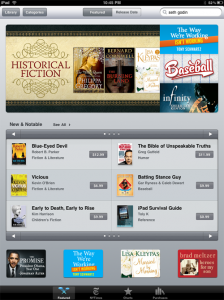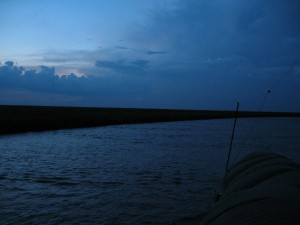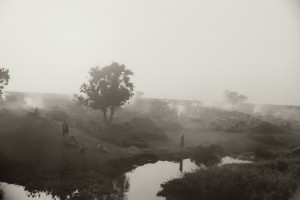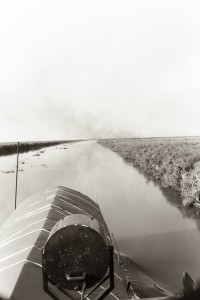If you’re in New York city this evening, join me for The Black Nile’s launch party at Idlewild Books, 12 West 19th St., off Fifth Avenue, at 7pm.
The Black Nile featured on Apple’s iPad
 Starting today, The Black Nile will be featured as a Book of the Week on Apple’s iBookstore, available to users of the iPad, iPhone, and iPod Touch. There are millions of these devices out there, though I’ve no idea how many people use them to buy and read books. I just saw my first iPad this weekend and I’ve got to say it looks really cool. It’s easy to see the allure of the iPad, Kindle, Nook, and other e-readers, but I think I’ll be sticking with dead trees for the time being. It’s hard to scribble in the margins of an electronic ink screen.
Starting today, The Black Nile will be featured as a Book of the Week on Apple’s iBookstore, available to users of the iPad, iPhone, and iPod Touch. There are millions of these devices out there, though I’ve no idea how many people use them to buy and read books. I just saw my first iPad this weekend and I’ve got to say it looks really cool. It’s easy to see the allure of the iPad, Kindle, Nook, and other e-readers, but I think I’ll be sticking with dead trees for the time being. It’s hard to scribble in the margins of an electronic ink screen.
If, like me, you still prefer hard copies to hardware, you can order a physical edition of The Black Nile from Amazon, Barnes & Noble, Borders, Powell’s, and your local independent bookstore.
The Black Nile reviewed in the Wall Street Journal
 Please check out this great review by Hugh Pope in the weekend Wall Street Journal. Here’s the kicker:
Please check out this great review by Hugh Pope in the weekend Wall Street Journal. Here’s the kicker:
Above all, Mr. Morrison’s peppery anecdotes, his refreshing honesty and his ability to show how Africans view their difficulties save “The Black Nile” from being simply a memoir of an author’s self-prescribed endurance test. Instead, the book gives us a compelling portrait of life along the Nile—from lonely fishing communities on Lake Victoria to the cacophonous collisions of Cairo. Mr. Morrison’s more discouraging encounters also quietly pay tribute to triumphs of the human spirit. Mr. Bryan, the author’s companion and verbal sparring partner for the first third of the account, later writes to him: “It’s good to be desperate once in a while. Gives you an appreciation of the looks on people’s faces when they’re desperate and you’re not.”
Egypt’s Battle to Control the Nile Waters
 My newest piece, on the struggle for control of the Nile. Here’s the lead:
My newest piece, on the struggle for control of the Nile. Here’s the lead:
I was standing inside a colonial-era circuit house in a sprawling, malarial city called Malakal in southern Sudan. I had come to see a man about a river, but the man, an Egyptian hydrologist, wasn’t talking.
“It is forbidden,” he said solemnly, “to speak of the Nile.”
I pointed towards the window. “But it’s right there,” I said. This was, after all, a measuring station of the Egyptian water ministry, one of several it maintained in Sudan and Uganda to track the volume of the world’s longest river.
The hydrologist didn’t need to look out the window. He knew where the Nile was–he’d devoted his life to its study. But there was nothing he could say to a stranger about something so important to his nation’s survival. I might have had better luck inquiring about Tehran’s nuclear program.
You can read the whole article here, and check out other great writing on the environment at the NatGeo News Watch blog.
The Black Nile “highly recommended” by Library Journal
 “Morrison’s narrative combines reporting and travelog in a way that brings readers to this most unlikely destination, a place of complexity, tension, struggle, and pain, where shreds of tradition and community are still visible.
“Morrison’s narrative combines reporting and travelog in a way that brings readers to this most unlikely destination, a place of complexity, tension, struggle, and pain, where shreds of tradition and community are still visible.
“Verdict: Morrison’s account transcends the travel genre to provide authentic and timely information on a complicated part of the world. Highly recommended.”—Melissa Stearns, Library Journal
Atrocity in Kampala
There’s a reason so many Westerners – tourists and humanitarians alike – visit Uganda in such numbers, and it goes beyond the stunning variety of natural wonders and the equally stunning toll of HIV and the Lord’s Resistance Army. It’s a wonderful place, full of wonderful people trying to eke their way out of often difficult circumstances.
Despite a modern history of war and trauma that would seem more appropriate to the capital of a much bigger country, Kampala is light of heart. It breathes. And while a sense of innocence lost may be inevitable after Sunday’s terrorist attacks, I hope the people and the government will resist a slide into fear and anger. (It may be too much to wish that this tragedy will not be used as a political cudgel. It was certainly too much to ask in the United States after September 11.) But I hope Ugandans will keep those urges and at bay. Here’s a piece I wrote analyzing the bombings for Slate.
Cut and Print: My first book trailer.
Apparently, no book is complete these days without an accompanying video. Here’s mine. I hope you like it.
The Black Nile – August 12 from Viking Penguin from DAN MORRISON on Vimeo.
Stories That Ring True: The Black Nile
 Part travelogue, part crazy adventure tale, part political reportage: Veteran foreign correspondent Morrison and a buddy build a boat and paddle up the Nile River through Uganda, Sudan and Egypt. Morrison’s African river journey is a paradoxical mixture of awe-inspiring discoveries, eye-opening human interactions and perilous escapes. — Chuck Leddy, the Minneapolis Star-Tribune
Part travelogue, part crazy adventure tale, part political reportage: Veteran foreign correspondent Morrison and a buddy build a boat and paddle up the Nile River through Uganda, Sudan and Egypt. Morrison’s African river journey is a paradoxical mixture of awe-inspiring discoveries, eye-opening human interactions and perilous escapes. — Chuck Leddy, the Minneapolis Star-Tribune
Why is F.A. Hayek #1 on Amazon?
I have no idea.
The New Deal and the Great Society didn’t turn America into fascist Italy or Nazi Germany, as some followers of the Nobel laureate economist predicted. Despite that fizzled prognostication, and the fact that he’s been dead since 1992, Hayek has the the number one book on Amazon right now. What’s the deal? Did Glenn Beck talk him up? (Yes he did.) Or is it because of Hayek’s skills as a rapper? When he puts it in rhyme I find I have to agree with him over John Maynard Keynes. The boom makes the bust.
UPDATE: Champagne corks must be popping at the University of Chicago Press, where The Road To Serfdom went out of stock June 10. Amazon sold more than 13,000 copies in one day, according to The Hayek Center.
What makes “War” so good?
 It’s been days since I finished tearing through WAR, the new book by Sebastian Junger, and I still still can’t figure out what makes it so good.
It’s been days since I finished tearing through WAR, the new book by Sebastian Junger, and I still still can’t figure out what makes it so good.
